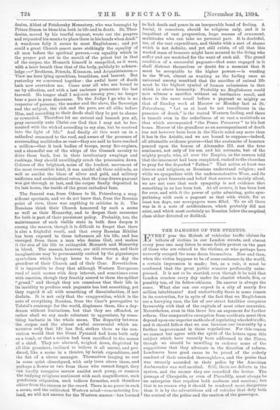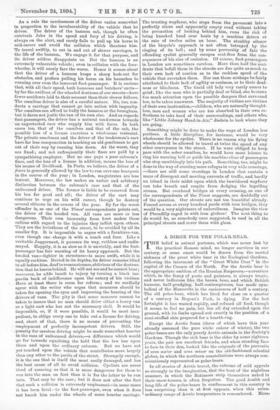THE DANGERS OF THE STREETS.
T.AVERY year the Moloch of vehicular traffic claims its tribute of victims in our London streets, and almost every year one may listen to some feeble protest on the part of those who are related to the victims, or who perhaps have narrowly escaped the same doom themselves. Now and then, when the victim happens to be of some eminence in the world, a certain impression is made; but, as a rule, it must be confessed that the great public remains profoundly unim- pressed. It is not to be startled, even though it be told that London crushes every day under its chariot wheels, five, or possibly ten, of its fellow-citizens. Its answer is always the same. What else can one expect in a city of nearly five million inhabitants? And undoubtedly there is some reason in its contention, for in spite of the fact that we Englishmen are a hurrying race, the list of our street fatalities compares favourably with that of the capitals of most other countries. Nevertheless, even in this there lies an argument for farther reform. Our comparative exemption from accidents must then depend upon our superior methods of regulating wheeled traffic, and it should follow that we can increase our immunity by a further improvement in these regulations. For this reason we cannot but agree with the spirit of the letters upon this subject which have recently been addressed to the Times, though we should be unwilling to endorse some of the suggestions that they advocate in the direction of reform. Londoners have good cause to be proud of the orderly conduct of their crowded thoroughfares, and the praise that was recently accorded to their police by the American Ambassador was well merited. Still, there are defects in the system, and the sooner they are remedied the better. The passage of Cheapside, or even of Piccadilly, must always be -an enterprise that requires both coolness and caution; but that is no reason why it should be rendered more dangerous than it is by the adventitious aid of vehicles that defy both the control of the police and the caution of the passenger. As a rule the carelessness of the driver varies somewhat in proportion to the invulnerability of the vehicle that he drives. The driver of the hansom cab, though he often .ontrivals Jehu in the speed and fury of his driving, is always on the alert, and rarely fails to pull up his horse in mid-career and avoid the collision which theatens him. To travel swiftly, to out in and out of slower carriages, is the life of the hansom. We engage it for that purpose, and its driver seldom disappoints us, But the hansom is an extremely vulnerable vehicle ; even in collision with the four- wheeler, it will surely fare the worse. Hence it comes about that the driver of a hansom keeps a sharp look-out for obstacles, and prefers pulling his horse on his haunches to running over even the innocent foot-passenger. It is curious that, with all their speed, both hansoms and butchers' carts— by far the swiftest of the wheeled denizens of our streets—have 'fewer accidents laid to their account than their slower fellows. The omnibus.driver is also of a careful nature. He, too, con- duets a carriage that cannot go into action with impunity. The omnibus can afford to bully the hansom or the brougham. but it dares not jostle the van of its own size. And as regards -foot-passengers, the driver has a natural tenderness towards an unprotected race who supply him with fares. In both cases too, that of the omnibus and that of the cab, the possible loss of a license exercises a wholesome restraint. The private coachman and the driver of the tradesman's cart have far less compunction in teaching an old gentleman to get out of their way by running him down. At the worst, they are fined ; and not unfrequently their fines are paid by a -sympathising employer. Bat no one pays a poor cabman's fines, and the loss of a license in addition, means the loss of his means of livelihood. In Paris, we believe, the driver of a fiacre is generally allowed by the law to run over one bourgeois in the course of the year ; in London, magistrates are less lenient. Moreover, the law makes an unfair and arbitrary distinction between the cabman's case and that of the -unlicensed driver. The former is liable to be removed from his box for good and all ; the driver of the cart may continue to urge on his wild career, though he destroy +several citizens in the course of the year. By far the worst offender is, as one of the Times' correspondents points out, the driver of the hooded van. All vans are more or less dangerous. Their own immunity from hurt makes them callous with regard to the injuries they inflict upon others. They are the leviathans of the street, to be avoided by all its smaller fry. It is impossible to argue with a furniture-van, even though one charge it with a coach and four. Like a veritable Juggernaut, it pursues its way, ruthless and undis- mayed. Happily, it is as slow as it is unwieldy, and the foot- passenger has fair warning of its heavy approach. But the hooded van—lighter in structure--is more swift, while it is equally reckless. Buried in its depths, its driver remains blind to all before him, deaf to remonstrance, oblivious of the destruc- tion that he leaves behind. He will not see and he cannot hear; moreover, he adds insult to injury by turning a black tar- paulin back of indifference upon the outcry of his victims. Here at least there is room for reform; and we cordially agree with the writer who urges that measures should be taken for opening the eyes and improving the hearing of the .drivers of vans. The pity is that some measure cannot be taken to insure that no man should drive either a heavy van or a light cart who has not the necessary skill. It would be impossible, or, if it were possible, it would be most inex- pedient, to oblige every one to take out a license for driving, and, short of that, there is no means of preventing the employment of perfectly incompetent drivers. Still, the penalty for careless driving might be made somewhat heavier in the case of unlicensed drivers,—a difference which would -go far towards equalising the hold that the law has upon them and upon the ordinary cabman. But we have not yet touched upon the vehicle that contributes more largely than any other to the perils of the street. Strangely enough, it is the one that is itself the most easily damaged, and has the best cause of all to avoid collision. Cyclists are never tired of assuring us that it is more dangerous for them to run into the man on foot than it is for the latter to be run into. That may be the case ; but it does not alter the fact that such a collision is extremely unpleasant—in some cases it has been fatal—to the foot-passenger, even when it does not knock him under the wheels of some heavier carriage. The trusting wayfarer, who steps from the pavement into a perfectly silent and apparently empty road without taking the precaution of looking behind him, runs the risk of being knocked head over heels by a machine driven at the rate of twelve miles an hour. The stealthy silence of the bicycle's approach is not often betrayed by the ringing of its bell ; and by some perversity of fate the offending cyclist generally escapes scot-free from the con- sequences of his sins of omission. Of course, foot-passengers in London are sometimes careless. More than half the acci- dents that befall them in the streets are due quite as much to their own lack of caution as to the reckless speed of the vehicle that overtakes them. Nor can these mishaps be fairly attributed to their lack of agility or coolness, or to their deaf- ness or blindness. The timid old lady very rarely comes to grief ; like the man who is partially deaf or blind, she bestows too much attention upon the possible dangers that surround her, to be taken unawares. The majority of victims are victims of their own inattention,—children, who are naturally thought- less, men and women who are too absorbed in their own re- flections to take heed of their surroundings, and others who, like," Little Johnny Head-in-Air," disdain to look where they are going.
Something might be done to make the ways of London less perilous. A little discipline, for instance, would be very wholesome for the cyclist. There is no reason why his flying wheels should be allowed to travel at twice the speed of any other conveyance in the street. If he were obliged to keep pace with the sober omnibus, he would have more leisure to ring his warning bell or guide his machine clear of passengers who step unwittingly into his path. Something, too, might be done in the way of erecting more refuges in very wide crossings, —there are still some crossings in London that contain a maze of divergent and meeting currents of traffic, and hardly an island in their midst upon which the bewildered wayfarer can take breath and respite from dodging the ingulfing stream. But overhead bridges at every crossing, as one of the correspondents of the Times suggests, are decidedly out of the question. Oar streets are not too beautiful already. Fenced across at every hundred yards with iron bridges, they would be a very nightmare of unloveliness. Imagine the view of Piccadilly caged in with iron girders ! The next thing to do would be, as somebody once suggested, to roof in all the principal streets and cover them with glass.







































 Previous page
Previous page